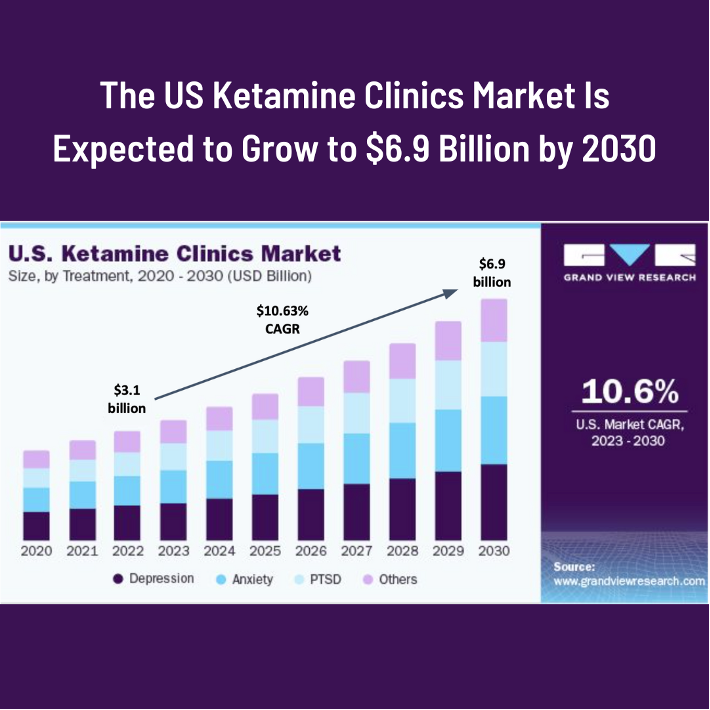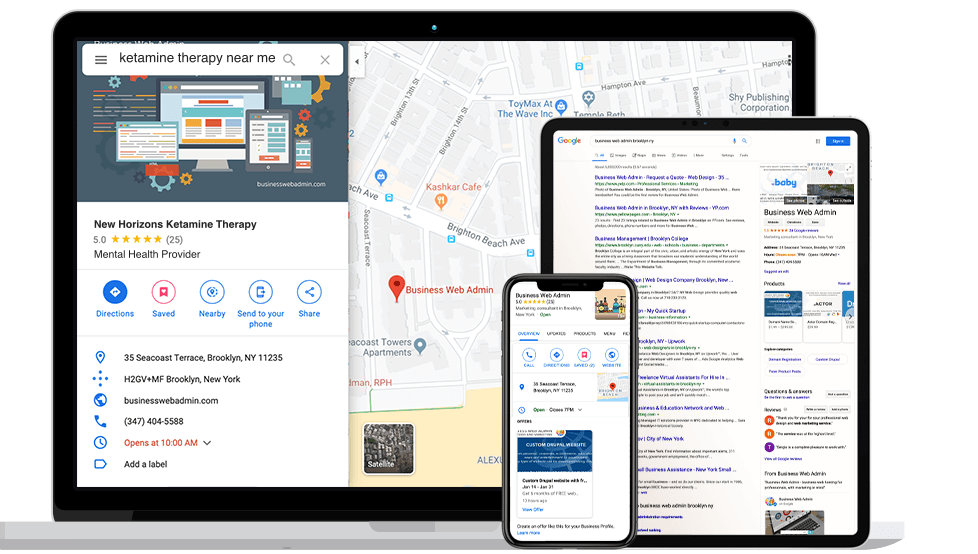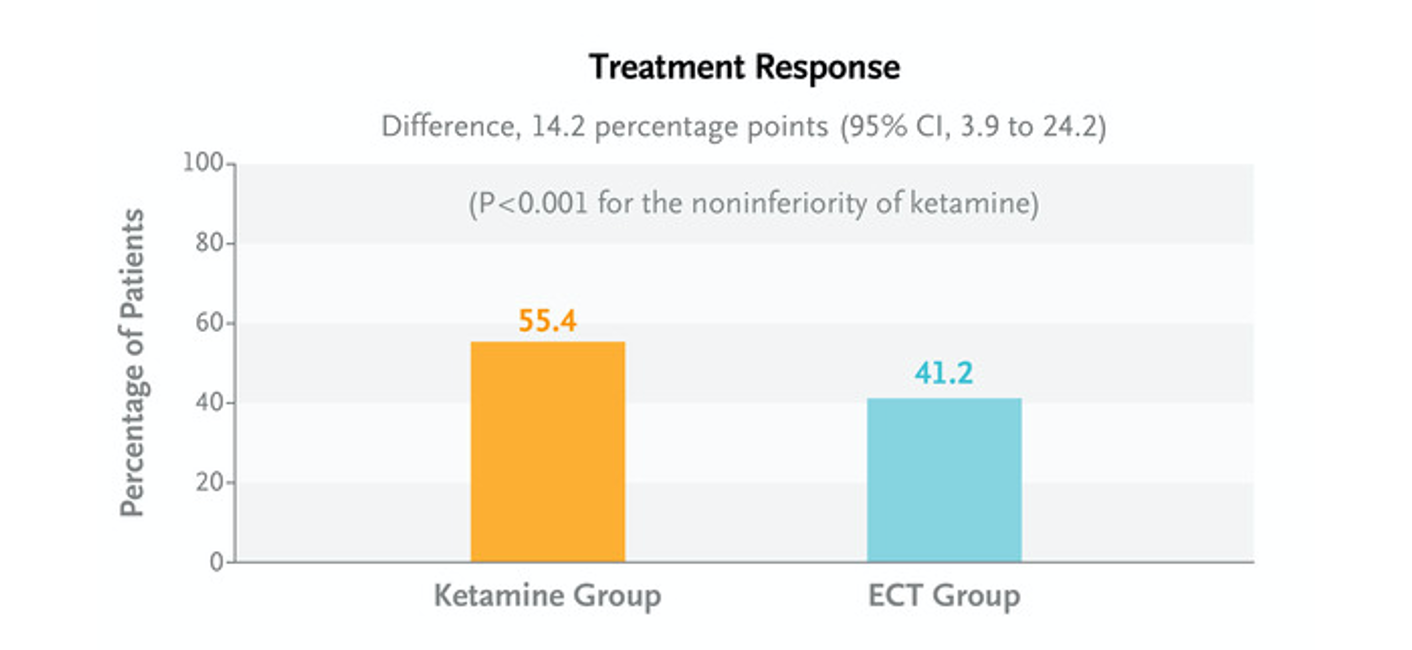
The integration of ketamine-assisted therapy (KAT) into mental health practices signifies a significant transformation in psychiatric treatment approaches. The process of administering a low dose of ketamine in a controlled setting, accompanied by psychotherapy, can induce a state of heightened suggestibility and openness, allowing patients to explore and process emotional and psychological issues more effectively during therapy sessions.
1. Lucrative Opportunities Exist in the Expanding Ketamine Therapy Market
Below are seven reasons why, more and more, progressive mental health providers are incorporating ketamine-assisted therapy into their service offerings as an important addition to the therapeutic arsenal.
The U.S. market for ketamine clinics, valued at $3.1 billion in 2022, is projected to nearly double to $6.9 billion by 2030, as per Grand View Research. This surge is fueled by rising demand for innovative treatments, the proliferation of specialized clinics, evolving investment landscapes, possible shifts in insurance coverage, technological progress, strategic partnerships, and educational initiatives. These converging elements present a vibrant and lucrative opportunity for mental health practitioners to augment their practice with KAT services.

2. Early Adopters Are Benefitting from Competitive SEO and Brand Positioning
The first page of Google is becoming more and more competitive in all industries, and the therapy industry is no exception. The ketamine therapy industry, however, is just now getting started, so to speak. So mental health providers who incorporate KAT at this nascent stage stand to gain a competitive edge establishing themselves in the world of search before the industry grows.
This is particularly true in dominating Google local search rankings using Google Business Profile (GBP). 98% of consumers use search to find out about local businesses, and a properly established and maintained GBP can receive somewhere between 80 and 300 clicks per month. Even new providers to the industry who optimize their ketamine clinic Google Business Profiles can enhance their brand visibility and dominate local markets before the arrival of intensified competition.

These early adopters can achieve prominent search engine rankings and foster robust social media networks. Additionally, forging connections with influencers and partners and positioning themselves as early experts in the field of ketamine-assisted therapy to further solidify their market presence.
3. Ketamine-Assisted Therapy Can Augment Psychotherapy
This shift towards investigating the therapeutic possibilities of ketamine in mental health stemmed from its observed prompt influence on mood disorders. Scientific investigations have revealed ketamine’s distinctive effect on brain chemistry, especially its modulation of glutamate. Glutamate is vital for mood regulation and neuroplasticity, and ketamine’s interaction with this neurotransmitter is a key aspect of its potential as a treatment option.
Traditional psychotherapy, while effective on its own, sometimes faces limitations. Ketamine, a medication known for its rapid-acting antidepressant properties, when used as a supplementary treatment, has been shown to enhance the therapeutic process. Patients receiving this combined treatment have demonstrated marked improvements in various mental health conditions, indicating a synergistic effect between ketamine and psychotherapeutic techniques.
According to experts, psychedelic medications like ketamine have the ability to decrease the activity of the Default Mode Network (DMN), which psychologists often describe as the brain’s “great orchestrator.” This reduction in DMN activity enables the mind to engage in a unique form of daydreaming and facilitates the formation of new neural pathways. As a result, ketamine-assisted therapy can create an opportunity for a fresh cognitive and emotional engagement with life, allowing individuals to perceive themselves from a novel perspective.
4. Ketamine Therapy Is Highly Effective in Treatment-Resistant Scenarios
One of the key factors driving the adoption of KAT is its efficacy in treatment-resistant depression (TRD). Traditional antidepressants, which primarily target the serotonin system, can take weeks to become effective and may not work for all patients. Ketamine, on the other hand, has shown the ability to provide rapid relief from depressive symptoms, sometimes within hours, which is a significant breakthrough for individuals with TRD.
In a clinical trial of 403 TRD patients, Massachusetts General Brigham researchers found that 55 percent of those receiving ketamine versus 41 percent of those receiving electroconvulsive therapy (ECT) registered an improvement in their self-reported quality of life that lasted throughout the six-month monitoring period. Furthermore, those who received ketamine treatment experienced a sustained improvement in depressive symptoms without major side effects.

5. Increased Public Awareness Is Creating Demand for Psychedelic-Assisted Therapy
A survey conducted by The Harris Poll The Harris Poll on behalf of Delic Holdings Corp, a leader in new medicines and treatments for a modern world, reported that nearly two thirds of Americans who suffer from anxiety/depression/PTSD (65%) believe that psychedelic medicine should be made available to patients with treatment-resistant anxiety, depression or PTSD, and that the substances should be made widely available. Sixty-six percent would be open to pursuing treatment using ketamine to treat anxiety, depression or PTSD if it was proven more effective than prescription medication with fewer side effects.
This openness reflects a shift in public perception, possibly driven by increasing awareness of the limitations of traditional treatments and a growing body of anecdotal and scientific evidence supporting the efficacy of ketamine. As public awareness of ketamine’s potential benefits in mental health treatment grows, so does the demand for services
6. Favorable Advancements in Regulatory Frameworks Are Encouraging Adoption
The landscape of mental health treatment witnessed a pivotal shift with the FDA’s 2019 approval of a ketamine-based nasal spray specifically for TRD. This move by the FDA not only served as a significant endorsement of ketamine’s therapeutic potential in psychiatry but also marked a turning point in how such treatments are perceived and regulated. Prior to this, the use of ketamine in mental health was largely experimental and faced various regulatory barriers.
The approval has had a ripple effect in increasing the accessibility of ketamine treatments. It has provided a regulatory framework and a level of legitimacy that was previously lacking, encouraging more healthcare providers to consider and offer KAT services.
7. The Emergence of Educational and Support Structures Are Enabling Success
The emergence of educational programs focused on ketamine therapy provides new practitioners with crucial knowledge about its pharmacology, therapeutic applications, and potential risks. This education ensures providers are well-equipped to administer ketamine safely and effectively. Continuous education keeps them abreast of the latest research and clinical practices.
Emerging support structures like ketamine therapy professional networks and communities serve as platforms where providers can share experiences, challenges, and solutions. The American Society of Ketamine
Physicians, Psychotherapists & Practitioners is the leading interdisciplinary community of collaborative practitioners led by experts providing education and ethical standards for patient care with ketamine and emerging treatments. The largest, and most active ketamine therapy Facebook group dedicated for patients and providers boasts over 13,000 members.
Ketamine.net is another community established to partner with providers and support seekers in finding care and providing critical information. This peer support is invaluable, especially for providers new to the field. Being associated with established educational and support structures can enhance a provider’s credibility, as well. This professional standing can attract more patients and collaborations.
Looking Forward
Clinics specializing in KAT are becoming more common, and forward-thinking mental health practitioners are integrating these services into their offerings to meet pressing demand. This expansion means that more patients suffering from severe forms of depression and other mental health conditions now have access to an alternative and potentially more effective form of treatment.
While it is not a one-size-fits-all solution, ketamine’s effectiveness in cases of treatment-resistant depression and acute crisis situations makes it an essential addition to a mental health provider’s toolkit for addressing the global mental health crisis. As research continues, it is essential to ensure that ketamine therapy is accessible to all who could benefit from its potential life-changing effects.



